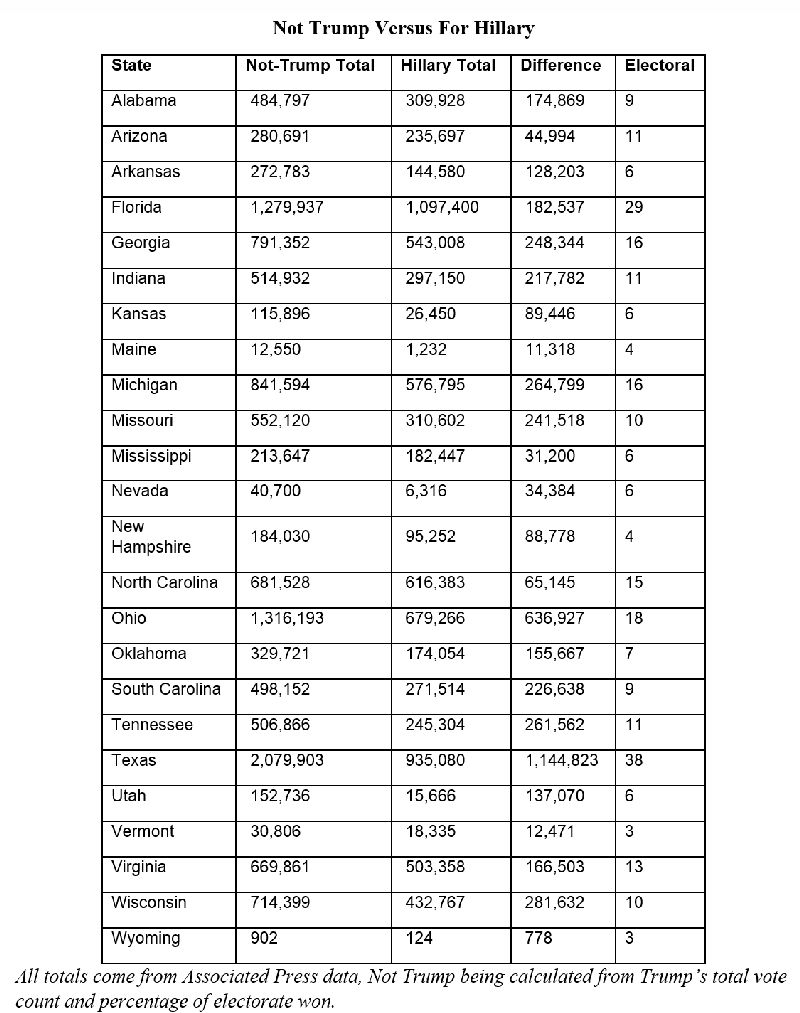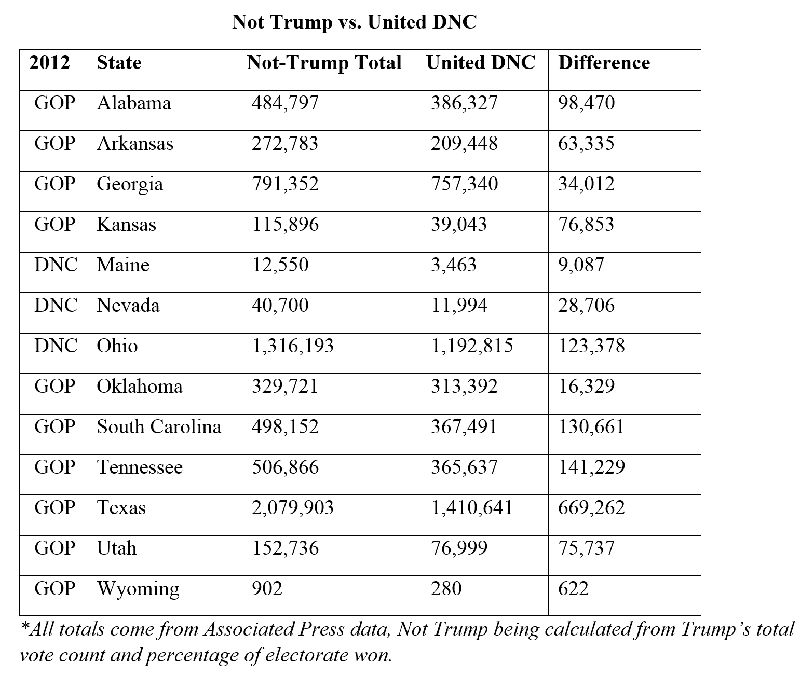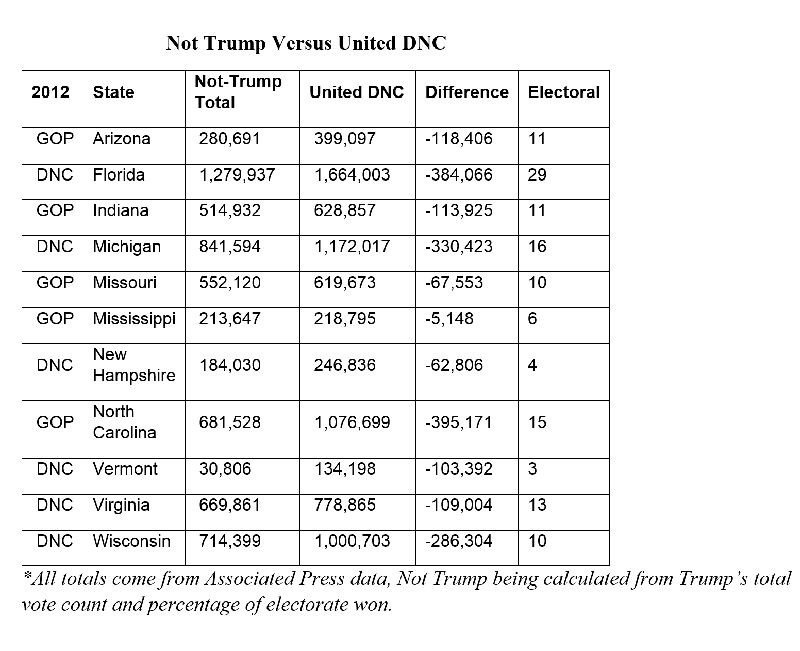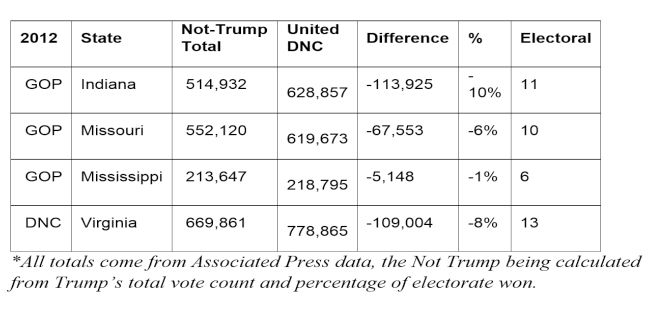How To
See other How To Articles
Title: These Numbers Say A Third Party Can Win The Presidency
Source:
The Federalist
URL Source: http://thefederalist.com/2016/05/16 ... -party-can-win-the-presidency/
Published: May 16, 2016
Author: Josiah Peterson
Post Date: 2016-05-16 15:11:12 by Hondo68
Keywords: Justin Amash (R-Michigan), 16M No Trump voters, Mike Lee (R-Utah)
Views: 3767
Comments: 10
For those who were serious about their Never Trump hashtags (or who would have been if they were on Twitter), it’s time to start rallying for a third-party candidate for the 2016 election. A third-party candidate isn’t just a protest against the system, but a viable chance at sparing the country the disaster that would be a Donald Trump or Hillary Clinton presidency. Abraham Lincoln (whose accomplishments seem to be completely unknown to the Republican nominee) would take umbrage with those who say a third party can never win. This two-term congressman from a six-year-old party beat the sitting vice president and a two-term senator, former War secretary, and speaker of the House to be president of the United States with almost 40 percent of the popular vote and 60 percent of the electoral vote. Thankfully, our country is not as divided as it was during the antebellum period, but the comparison between Republicans and the mid-nineteenth-century Whigs is less of a stretch. While Lincoln is in many respects in a class to himself, we don’t need to have Lincoln’s level of electoral success to win. You don’t need a majority, or even a plurality, of electors to win the presidency. Let me explain. If no candidate for president receives a majority of electoral votes, then the House of Representatives decides the election—the current House of Representatives. So the third-party candidate wouldn’t need to win a majority outright so long as no other candidate does either. Borrowing a hypothetical sketched out by J.C. Derrick from his excellent World magazine article back in March: Consider this scenario: Trump and Clinton represent the major parties in November, and most states mirror the 2012 results, but Trump adds wins in Florida, Ohio, Virginia, and New Hampshire. Those 64 electoral votes would put Trump at 270 and Clinton at 268. But suppose, for example, Rick Perry runs on a third-party ticket and manages to win his home state with its 38 electoral votes. He would deprive both candidates of the requisite 270-vote majority and throw the outcome to the U.S. House of Representatives, which would choose the next president from among the top three contenders. Is it possible for a third-party candidate to actually win states? In 20 percent of twentieth-century elections, third-party candidates did just that (Roosevelt in 1912, La Follette in 1924, Thurmond in 1948, Byrd in 1960, Wallace in 1968). Now, none of them won the right combination of states to deny other candidates a majority, but that also happened twice, in 1824 electing John Quincy Adams and in 1876 electing Rutherford B. Hayes. More recently, Ross Perot garnered nearly 20 percent of the vote, although he failed to win a state. In the twenty-first century, Alaska, Connecticut, Minnesota, Maine, and Vermont elected third-party statewide office holders (Bill Walker elected governor of Alaska in 2014, Joe Lieberman elected to U.S. Senate from Connecticut in 2006, Jesse Ventura elected governor of Minnesota in 1998, Angus King elected to the U.S. Senate from Maine 2012, and Bernie Sanders elected to the U.S. Senate in Vermont 2006 and 2012). Trump likes to brag about winning more than 10 million votes. He leaves out the fact that almost 16 million people voted for someone other than Trump. Of the 27 contests Trump won before he became the presumptive nominee, he only received majorities in seven of them. He also lost in 13 contests, bringing the number of states in which he did not win a majority to 33 (WY, DC, UT, MN, KS, IA, TX, ID, OK, ME, AK, WI, OH, CO, SC, VT, AR, VA, NH, KY, MI, GA, IL, TN, NC, MO, LA, HA, AL, FL, NV, AZ, MS, and MA). We can compare 28 of these 33 with the Democratic nominating contests in those states (excluding Alaska, Colorado, Idaho, and Iowa for having differing systems between Democrats and Republicans, and Kentucky, which hasn’t had its Democrat primary yet). We find that the total number of voters not voting for Trump (Not Trump) in the Republican primary was greater than the total of voters for Clinton in the Democratic primary in 24 contests. The combined electoral value of these 24 states is 267. That’s not even including the deep red states of Montana, North Dakota, and South Dakota, which haven’t voted yet, and deep red states Idaho and Alaska, whose GOP nominating contests aren’t comparable to the DNC’s. That’d be another 21 electors, for a total of 288, enough to win the presidency outright! But what if the Democratic Party consolidates around Clinton? How does Not Trump fair against the combined force of the Democratic Party (United DNC)? First let me note that United DNC isn’t remotely a guaranteed outcome. There’s a strong Never Hillary movement and so far Bernie Sanders has shown no signs of offering olive branches. He’s even complained about his mistreatment by the Democratic Party and might be tempted to make a third-party run himself, as he has in 20 out of 20 of his past elections, 14 of them against other Democrats. Even if he does make peace with Hillary, there’s no guaranteeing his supporters will. Some may even go to Trump. Let it also be noted that the most likely thing to produce a United DNC is if it comes down to Clinton versus Trump. But I digress. How does Not Trump compare to United DNC? Actually, not too bad. Not Trump still wins 13 states, including nine conservative-leaning states that went Republican in 2008 and 2012, and four states—including Ohio—that went Democrat in the past two cycles. The grand total of electors for Not Trump in this scenario is now 149, enough to keep Trump out of the presidency. Also, remember that Not Trump would still finish second in the other ten races, giving him or her an even more viable shot at winning the House of Representatives. This still leaves the path open for a United DNC, whose potential loss of three states and their 28 electors could be offset by the Not Trump candidate splitting with Trump and giving up five states the GOP won in 2012 and their 53 electors. Assuming everything else matches 2012, that would leave the DNC with 351 electoral votes. Here’s where it gets tricky, but is not impossible. Trump or Not Trump would need to peel away 82 electors from states such as Florida (29), Virginia (13), Arizona (11), North Carolina (15), Missouri (10), Mississippi (6)—where Hillary won her primary—Michigan (16), Wisconsin (10), Minnesota (10), Indiana (11), and New Hampshire (4)—where Hillary lost. Is it possible? Florida went for little-known state representative Marco Rubio against sitting Gov. Charlie Christ and Democratic Rep. Kendrick Meek in their three-way Senate election in 2010. If you were to throw in the states where the difference between Not Trump and United DNC is less than 10 percent—including Indiana, Missouri, Mississippi, and Virginia—the combined total would be 69 delegates. That still gives United DNC—which, remember, may not happen—a 13-vote electoral cushion to win the presidency. But that doesn’t take into account the states where the more liberal Trump may prove spoiler to United DNC. Trump says he can put New York (29 electors) in play. Politico predicts majority-white, blue-collar states like Iowa (6), New Hampshire (4), Pennsylvania (20), and Wisconsin (10) may very well go Trump. These states provide a number of scenarios in which Clinton could be denied the presidency and the election goes to the House. How likely is any of this to happen? That in part depends on how you read the trends. FiveThirtyEight points out that “America’s Distaste for Trump and Clinton is Record-Breaking.” Sanders—whose name was barely known outside his home state of Vermont until earlier last year—has taken more than 9 million of the nearly 22 million votes cast in Democratic primaries. The combined Not Trump and Not Hillary votes total more than 25 million out of the about 48 million votes cast, for more than 52 percent. Is Hillary’s star rising or falling? Will she be able to shake off the Wall Street ties to unite her base and the FBI investigations to keep her from jail before November? Is Trump going to start tacking Left to “expand the party,” go after disaffected Bernie supporters, possibly to the point of naming a Democrat as his vice president? How is the Trump University trial, which starts the same day as the Republican convention, going to affect Trump’s persona as an unprincipled hustler? Will his tax returns, if they ever come out, hurt him like they did Mitt Romney back in 2012? Would Sanders follow the urging of his supporters to go third-party or support Green Party candidate Jill Stein? (His campaign manager says he won’t, but I can’t find Sanders himself saying this anywhere.) There’s a few other points of context to consider. The media has been reveling in this political circus and would likely provide a lot of free air time to a credible third candidate (especially if they think it could help Hillary). Alternative media could help with the initial launch, and social media could help with the organizing. There are some top-quality political staffers and consultants in need of a job right now, including those credited with running the best organized campaign in the country. Politico just ran a story saying “Republican donors want nothing to do with Trump,” meaning that money might be available to go elsewhere. The Never Trump campaign has many friends in the media sphere, including Glen Beck, Mark Levin, Erick Ericson, and George Will. Few national political leaders have taken steps to embrace Trump as you’d expect if the party were going to consolidate. The only new endorsement I could find was by Mitch McConnell, who sort of has to since he’s the Republican majority leader. Rubio and Paul have indicated they will hold to their pledge to support the Republican nominee, but can’t bring themselves to say they are supporting Trump just yet. House Speaker Paul Ryan has avoided an endorsement. Sasse is already calling for a credible third-party candidate, and Sen. Lindsay Graham says he can’t vote for Trump or Hillary. There’s even a new ad campaign by famed advertiser Bob Gardner to “unsell Trump.” Obviously none of the primary data ultimately determines general election results. Not everyone votes in the primaries. But those who do vote are those most committed their candidates. If Trump doesn’t improve much from his primary total of 10 million, he’s in a heap of trouble come November. Meanwhile, Not Trump has almost 16 million voters, many of whom are experienced in the political process and could turn into the base of volunteers and organizers for the Not Trump candidate. Finding a candidate who could pull this off is not going to be easy. While up-and-coming conservative stars like Justin Amash (R-Michigan), Mike Lee (R-Utah), Tom Cotton (R-Arkansas), James Lankford (R-Oklahoma), and even Rubio and Ted Cruz show much promise for 2020 and beyond, for these potential candidates a 2016 third-party run would be premature and possibly compromise their future prospects. Anyone who ran in this cycle who pledged to support the Republican nominee has effectively disqualified himself. Paul, whose “different kind of Republican” status may have made him perfect for such a run, has taken himself out of the running. That pledge was a foolish error in judgement by those that made it and ought not be repeated. Any potential candidate needs to be prepared for immense backlash from those Republican leaders who care most about getting an “R” in the White House and those conservative voters who are legitimately afraid a Clinton presidency. They are going to need to make the case, like I do above, that a third-party campaign need not be another Perot spoiler for a Clinton. When 52 percent of voters have preferred someone other than the front-runners, there’s room for a credible third-party run. In calling for a third-party candidate, Sasse said we can’t have a purity test. While this is true to an extent, the candidate will need to be able to differentiate him- or herself from the two major front-runners, and unimpeachable integrity plus a respect for the Constitution and limited government would be the appropriate way to do that. They won’t be able to pull off a third-party run if they can’t get the 16 million “No Trump” voters excited and working for their cause. So we need someone who cares more for principle than party, cares more for the country than for themselves (because, let’s face it, this probably isn’t going to be a fun ride), and who has the time and credibility to make the case for conservative values. Three names come to mind for the top of the ticket, with one more likely than the other two. An eminently credible candidate who’s already said he’s on board with supporting a third-party candidate to stop Trump is former senator Tom Coburn of Oklahoma. Coburn served three terms in the U.S. House and two terms in the Senate before retiring from political office in 2015. He was seen as a man above partisan politics, refusing to sign the Grover Norquist “No Tax” pledge while willing to call both parties to task for fiscal irresponsibility and partisan obstructionism. He literally wrote the book on how “Washington Turns Outsiders Into Insiders,” and claimed fame through his annual “Wastebook” reports highlighting frivolous government spending. He’s known by thousands of activists through his affiliation with “Open the Books” and the “Convention of States” project to amend the Constitution. At a time when people are hungry for someone who stands above the fray, is incorruptible, and desires to change the culture in Washington, Coburn would be a breath of fresh air. While he may benefit from reading Arthur Brook’s new book “The Conservative Heart” to translate some of his budget speech into people-focused rhetoric, no one can say he takes himself too seriously, as evidenced by his rendition of “Rocket Man” that the AP caught on camera. My liberal friends in grad school had nothing but respect for this man, some even saying he’s a Republican they could actually see themselves voting for. Other potential candidates include former Indiana Gov. Mitch Daniels and former South Carolina Sen. Jim DeMint, but both men would have to give up their comfortable positions as presidents of Perdue University and the Heritage Foundation, respectively, and the former’s Bush affiliation and the latter’s perceived partisanship may come back to haunt them. For vice president I’d honestly consider having Carly Fiorina on the ticket. While people joked about her falling off stage or singing a song in her acceptance speech, they tended to ignore her growing popularity and her deftness at slamming Trump and Hillary. She’s got the time, the name ID, and the pizazz to keep the campaign interesting, and her fan base would come out to support her. So, what would it take for this all to happen? The first step is to get a candidate. What does that take? For anyone in his right mind to run for president, he’d have to believe he has the supporters out there willing to help make it happen. I’d propose starting a draft movement, organized loosely by social media, in which people who are fed up with the two party options commit to raising $1,000 or donating 100 hours to support a credible third-party candidate like one of the above. For every 1,000 people, that would be either $1 million or 100,000 hours. That’s a drop in the bucket for what would be necessary, but it would show the potential candidates that they would have a base of support committed to making this happen, and be a good signal to larger donors and campaign operatives that such a campaign would be viable. These same supporters should be telling their local political leaders that they should not support Trump if they want to remain in favor. Once a candidate has agreed to throw his or her hat into the ring, he or she needs to get on the ballot. This will be the biggest and most time-sensitive hurdle. According to BallotPedia, to get on the ballot the candidates need to either secure the nomination of a party that is already guaranteed a spot on the ballot due to previous election tallies, petition state by state with a preset number of eligible voters to qualify for ballot access as an independent, or file some paperwork to be a viable choice as a write-in candidate. The necessary signatures states require vary from 275 in Tennessee to 178,039 in California, and this is where it would be great to have the disaffected members of the Cruz and Jeb Bush campaigns coordinating efforts. Four state filing deadlines are coming up in June (North Carolina 6/9, Illinois 6/27, Indiana 6/30, New Mexico 6/30), and Texas’s just passed a few days ago, meaning the candidate would most likely need to mount a write-in campaign. (Write-ins have won statewide before, and Coburn would be known to his neighboring Texans). The next major hurdle would be qualifying for national political debates by meeting a certain threshold of support (usually around 15 percent). The two major parties would probably not be too happy about this (at least one of them wouldn’t), but national debates used to be hosted by independent groups like the League of Women Voters and the Citizen’s Debate Commission was formed back in 2004 to return debates back to independent organizations. There’s even a lawsuit out against the party-controlled “Commission on Presidential Debates” for violating anti-trust laws, which may result in reforms to the presidential debate system. The rest is up to the candidate and his or her surrogates to make news cycles, draw in folks to rallies and town halls, and generally get his or her voice out as a credible candidate. They’d want to make the ethical and person-centered case for conservative values, arguing that the free market is best for social mobility and growth is the best way to raise wages, that big government and regulations feed crony capitalism, that American freedom cannot tolerate Islamic despotism, that health care and education work best when putting patients and students before insurance companies and unions, that serious reforms are needed to ensure a fair justice system for all, and that strong families are the greatest asset out country could ever have. They’d want to reach out to minorities, independents, students, and pragmatic Democrats and avoid sectionalism and partisan rhetoric. We don’t have a lot of practice with this, but it’s long overdue we start. History and present circumstances suggest that a third-party candidate could win, if not a majority, enough states to send the election to the House of Representatives. The candidate would need to be a credible, outside voice who could challenge the two major candidates in demeanor and policy substance, someone like Coburn. Cruz’s team and Bush’s donors are out there, still opposed to Trump and Hillary, and if there’s a show of support from the people—enough to offer a candidate who didn’t go through the traditional nominating process democratic legitimacy—then such a candidate could very well thrive in this media-saturated environment, qualify for enough statewide ballots, and get into the presidential debates. From there, it would be up to the people to throw off the tyranny of a broken two-party nominating process and elect an adult to the White House. Let’s get to work.You don’t need a majority, or even a plurality, of electors to win the presidency. Let me explain.
The Historical Precedent for a Third Party
The Current State of the Race

Now Compare Not Trump to United Hillary



What’s the Probability?
Who Could Be the Not Trump Candidate
How to Take the Next Steps
Post Comment Private Reply Ignore Thread
Top • Page Up • Full Thread • Page Down • Bottom/Latest
Begin Trace Mode for Comment # 8.
#4. To: hondo68 (#0)
At one time I thought there could be a third party but all that happens is the progressives win when they should have lost and the country moves even more dramatically to the socialist side. Which means more crazy ass laws where gay people, non white people and progressives get more special rights while everyone else get less rights. Central government gets bigger and crony capitalism gets a tighter grip on US of A. Either you work with in the 2 party system or cause progressive to win when they should not making things worse for all. If you want to break the grip by elites vote for Sanders or Trump. Any vote other than that is a vote for more of the same(Cruz would have been a vote against the elites). Its been proven over and over but people still think voting 3rd party will work. Thats sounds like the definition of insanity!
IMO,there was a excellent chance of a 3rd Party taking the WH,but then that asshole Perot was hired by the Clintons to run as the 3rd Party Candidate,and he sucked all the voters away from the legitimate candidates and then dropped out of the race. Twice.
#9. To: sneakypete (#8)
I voted for bush but regret it. Wanted to vote for Ross.
Top • Page Up • Full Thread • Page Down • Bottom/Latest
#8. To: Justified (#4)
At one time I thought there could be a third party
Replies to Comment # 8.
End Trace Mode for Comment # 8.
[Home] [Headlines] [Latest Articles] [Latest Comments] [Post] [Mail] [Sign-in] [Setup] [Help] [Register]
